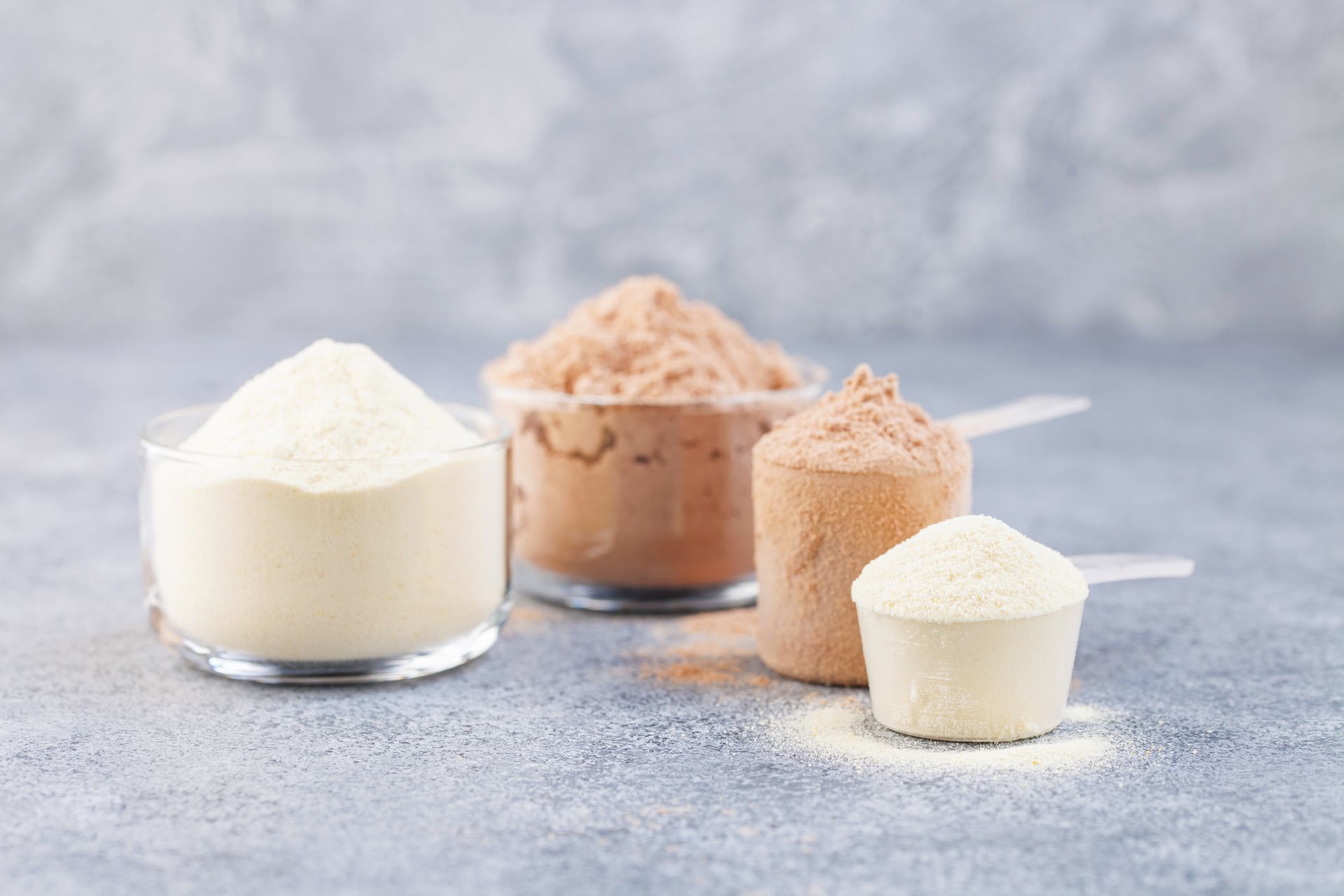
It's clear that people who regularly engage in sports need larger amounts of protein than those with sedentary lifestyles. That's why many gym-goers use protein supplements to help meet their increased daily protein requirements. Let's find out what types of protein nutrient are and how plant protein nutrient differs from animal protein nutrient.
- Animal protein nutrient
- Plant-based protein supplement
- Plant protein conditioner vs animal protein conditioner
- Plant protein nutrient - how to increase its anabolic potential?
Animal protein nutrient
Of all the protein nutrients available on the market, whey protein is undoubtedly one of the most popular. It accounts for nearly 20% of all proteins contained in cow's milk and has a high biological value. Protein nutrition based on whey protein has a high content of essential amino acids (essential for the human body), including three with branched-chain amino acids (BCAA), which include isoleucine, leucine and valine. There are three main types of whey protein nutrition:
-
Whey Protein Concentrate (WPC) - this is the least processed protein nutrient, which usually contains 70-80% protein and small amounts of fat and milk sugar (lactose).
-
Whey Protein Isolate (WPI) - is a formula that contains 85-90% protein and trace amounts of lactose and milk fat.
-
whey protein hydrolysate (Whey Protein Hydrolysate, WPH) - is the most expensive protein nutrient, which is mainly intended for people with known allergies to cow's milk proteins, due to its content of easily digestible short-chain peptides.
Other protein nutrients of animal origin, such as micellar casein (cow's milk protein), beef protein, or egg protein are far less popular than the aforementioned whey protein, and especially WPC and WPI.

Plant-based protein supplement
The ever-increasing interest in a vegan diet means that plant protein nutrients are now widely available on the dietary supplement market for physically active people. Plant protein supplement is a great addition to the diets of professional athletes and amateurs on a vegan diet, as it is usually very difficult or even impractical to get enough protein from plant foods alone, especially when the goal is to build muscle mass. The most commonly used plant protein nutrients include soy protein isolate, pea protein isolate, hemp protein, rice protein and yeast protein. You can also find spirulina powder and a variety of vegan protein blends on the plant protein nutrition market, including sunflower protein, pumpkin seed protein, flaxseed protein and quinoa protein.
Plant protein conditioner vs animal protein conditioner
Animal protein nutrition, such as whey protein (WPC and WPI), for example, has the highest biological value of any protein found in food. This is primarily due to the high content of all amino acids essential for humans (including BCAAs) and their high digestibility and assimilability. Compared to whey protein, a plant protein supplement (such as soy protein isolate) contains a much lower amount of essential amino acids per 1 g, and even more especially less branched-chain amino acids(BCAA), namely leucine, isoleucine and valine. Leucine content is crucial for stimulating muscle protein synthesis. The latest scientific reports indicate that a plant protein supplement (such as soy protein isolate) containing 2 grams of leucine can lead to identical increases in strength and muscle mass in people beginning regular strength training as an animal protein supplement (whey protein). An ever-increasing number of studies show that a plant protein nutrient can be effective in terms of strength and muscle mass gains to the same extent as an animal protein nutrient when consumed in amounts that provide sufficient leucine.
Plant protein nutrient - how to increase its anabolic potential?
The easiest way to overcome lower levels of essential amino acids and reduced digestibility is to increase the amount of plant protein per serving. To maximize muscle protein synthesis (MPS), it's worth aiming for an intake of 40-45 grams of protein from a plant-based protein supplement per meal, for example. If we consider amino acid digestibility indices (PDCAAS and DIAAS), a plant-based protein nutrient based on soy protein isolate or pea protein isolate is the best choice for vegans. It is also recommended to combine different plant protein sources within a single meal to increase essential amino acid levels. In addition, vegans may consider supplementation with leucine or BCAAs to boost anabolic processes.
Sources:
-
Rogerson D.: Vegan diets: practical advice for athletes and exercisers. J Int Soc Sports Nutr. 2017 Sep 13;14:36. https://pubmed.ncbi.nlm.nih.gov/28924423/
-
Lynch HM, Buman MP, Dickinson JM, et al: No Significant Differences in Muscle Growth and Strength Development When Consuming Soy and Whey Protein Supplements Matched for Leucine Following a 12 Week Resistance Training Program in Men and Women: A Randomized Trial. Int J Environ Res Public Health. 2020 May 29;17(11):3871. https://www.ncbi.nlm.nih.gov/pmc/articles/PMC7312446/
-
Sepandi M, Samadi M, Shirvani H, et al: Effect of whey protein supplementation on weight and body composition indicators: A meta-analysis of randomized clinical trials. Clin Nutr ESPEN. 2022 Aug;50:74-83. https://pubmed.ncbi.nlm.nih.gov/35871954/
-
Kim J.: Pre-sleep casein protein ingestion: a new paradigm in post-exercise recovery nutrition. Phys Act Nutr. 2020 Jun 30;24(2):6-10. https://pubmed.ncbi.nlm.nih.gov/32698256/
-
Reis CEG, Loureiro LMR, Roschel H, et al: Effects of pre-sleep protein consumption on muscle-related outcomes - A systematic review. J Sci Med Sport. 2021 Feb;24(2):177-182. https://pubmed.ncbi.nlm.nih.gov/32811763/
-
Lim MT, Pan BJ, Toh DWK, et al: Animal Protein versus Plant Protein in Supporting Lean Mass and Muscle Strength: A Systematic Review and Meta-Analysis of Randomized Controlled Trials. Nutrients. 2021 Feb 18;13(2):661. https://pubmed.ncbi.nlm.nih.gov/33670701/
-
Kerksick CM, Jagim A, Hagele A, et al: Plant Proteins and Exercise: What Role Can Plant Proteins Have in Promoting Adaptations to Exercise? Nutrients. 2021 Jun 7;13(6):1962. https://pubmed.ncbi.nlm.nih.gov/34200501/
-
https://www.ais.gov.au/nutrition/supplements/group_a#isolated_protein_supplement
 ⮜ Previous article
⮜ Previous article
Training performance of the body - what is it?
 Next article ⮞
Next article ⮞